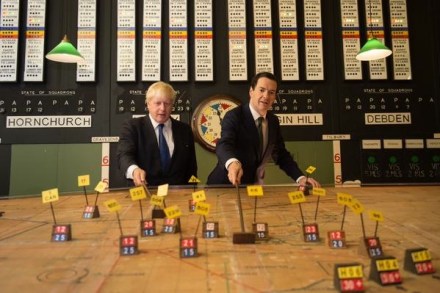Coffee Shots: George Osborne pays a visit to Boris Johnson’s bunker
An excerpt from Anthony Seldon’s David Cameron biography claimed that George Osborne finds his Tory leadership rival Boris Johnson ‘plain annoying‘. Happily the pair put any differences aside today as the Chancellor of the Exchequer paid a visit to Johnson’s constituency. The happy duo visited the Battle of Britain Bunker in Uxbridge to see how a £1m investment will help to restore the historic site. This bunker, if you remember, was the one Osborne joking referred to in the Budget when he said ‘I want to thank the member for Uxbridge and South Ruislip for bringing to my attention the dilapidated state of his campaign bunker’. The Mayor invited Osborne to




















